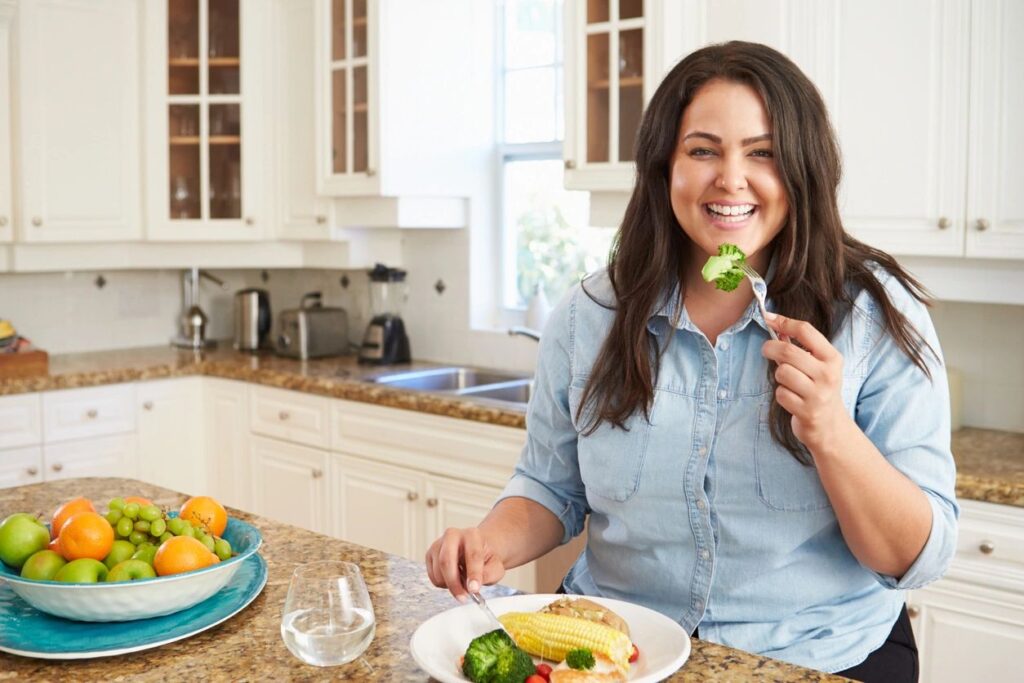How All-Or-Nothing Thinking Is Sabotaging Your Health Goals

In this post I discuss how all-or-nothing thinking is preventing you from reaching your health goals, and what to do about it.
Picture this: you decide to start eating better, so you begin choosing more vegetables and tell yourself: no more ice cream! A few weeks go by and you do pretty well sticking to your goal, in fact, you’re feeling so good you’ve also started exercising, and have even lost some weight – you’re motivated!
But then, you start to feel tired and begin craving sugar. Oh, and did I mention you’ve now also pretty severely cut calories and other carbohydrate sources? Your diet consists mostly of meat and vegetables, but is limited in grains (especially bread and pasta), beans, fruit, snack food, and of course, ice cream.
Now, it’s time for your mom’s birthday celebration. Everyone is served cake and ice cream for dessert. You look longingly at the ice cream, your stomach grumbles, and finally you decide you’re craving it way too much to pass it up, so you eat some – maybe a little more than you meant to.
Unfortunately, instead of saying “that was delicious” and moving on, you beat yourself up for “failing” and “ruining” your “perfect” diet. Instead of getting back into healthy habits, you decide: what’s the point? And go back to your old eating habits, gain the weight back that you’ve lost, and are right back to where you started.
Any of this sound familiar? Can you relate?

Let’s back up a little bit. I’m a dietitian and I work with people 1:1 on a daily basis, a majority of who are striving for health and weight loss. So, I hear this a lot. I hear about long term dieting histories, of those who were successful for a period of time, but then “gave in” to “bad” foods or foods that “weren’t allowed”, felt guilty, and couldn’t work passed that.
Here’s the thing, when it comes to healthy eating, we DON’T HAVE TO BE PERFECT! Nor, do we have to set unreasonably high expectations for ourselves. In fact, this actually sets us up to fail instead of succeed.
Research actually supports this as well. One study from the journal Appetite looked at the associations between guilt or celebration with chocolate cake and found that:
“Participants with a weight-loss goal who associated chocolate cake with guilt were less successful at losing weight over a 3 month period compared to those associating chocolate cake with celebration.”
Kuijer RG, Boyce JA. Chocolate cake. Guilt or celebration? Associations with healthy eating attitudes, perceived behavioural control, intentions and weight-loss. Appetite. 2014 Mar;74:48-54. doi: 10.1016/j.appet.2013.11.013. Epub 2013 Nov 23. PMID: 24275670.
I know this to be true because I work with many people who struggle with all-or-nothing thinking, but I’ve also been there myself. I strictly avoided certain foods and tried to be too perfect with my diet, which really only led me to feel worse and created a lot of stress around eating and food choice (read more about my story here and here) – not a great way to live!
All-or-nothing thinking sabotages our health goals because we only think in the extremes and struggle to strike a balance. We tend to swing too far in one direction or the other, thinking we need to eat perfectly healthy, or have unlimited junk food. We’re either on a diet or we’re off one.
But, what about just forming healthy eating habits? No actual diet? Sometimes I think that we feel rules help keep us on track, but what happens when we break the rules? We feel we’ve failed, which keeps us from reaching our goals.
So what do we do about this? How do we find a balance and stop trying to be so perfect, while still working towards our health goals?
How to stop all-or-nothing thinking and achieve lasting success with our health goals
Step 1: Choose ONE goal to start
Instead of doing a Whole30 challenge, keto diet, or anything else that’s extreme or highly restrictive, choose one habit to start with that will help move the needle forward. Additionally, make it something that feels doable and approachable, and that you could see yourself doing for years to come.
In fact, when we choose just one thing to work on, we are over 80% more likely to continue with that habit, but when we choose 3 things to work on at once, we are only 5% likely to continue.
Some examples might include focusing on drinking more water, adding a serving of vegetables to your day, getting enough protein at meals, or making it a habit to eat breakfast.
Once you’ve made that one thing a habit, it starts to feel normal and you stop needing to really think about it. At that point, move on to the next habit! For example, maybe you feel good about where your diet is at, so now you add in some exercise.
Don’t know where to start with your one thing? Or don’t know how to make something a habit? Work with me and I will help you come up with a specific goal and personalized plan.
Step 2: Reframe your mindset
Instead of telling yourself “I can’t have that”, try “I can have whatever I want, but I’m choosing this.” Or, instead of just making a goal to not eat something ever, plan it out and allow yourself the occasional treat. Maybe it’s pizza fridays, or a homemade cookie in the evenings.
When we sense deprivation or restraint, it only makes us want something more. But, when we sense that we have full freedom around something, it’s actually less enticing. Just because we make a goal to begin eating healthier, does NOT mean we have to give up foods we love that may not be as healthy. It just means we are going to choose to eat them less often.

Step 3: Remember that it’s about more than weight loss
Another thing I see happening is that once weight stalls, people become frustrated and go back to old eating habits simply based on the scale number. But what about overall health? What about how you’re feeling? What we eat for weight loss CAN be the same as what we eat for health. So, even if the scale isn’t moving, choose foods because they give you more energy, help you sleep better, keep your heart healthy, make you feel happier and more confident, etc. and often times the scale will budge again eventually.
Plus, you’ll have long-lasting health as a result. And isn’t that the point? Most people don’t want to lose weight for the sake of weight loss, but to achieve something else from it: better mobility, do more activity, play with/be around for their kids, be in less pain, etc. That doesn’t happen if we only eat healthily for a week or two – we need long term consistency.
Step 4: Aim for consistency, not perfection
Think about being consistent in your healthy habits, rather than about being perfect. For example, if 17 out of 21 meals each week are healthy and we are able to keep this up for months, even years, that’s consistency.
But, if we strive to make every meal perfectly healthy, we may only last a week or two. Then, we might feel exhausted and end up eating only a handful of healthy meals for the next few weeks before restarting that cycle, which is NOT consistent. This could also be called yo-yo dieting.
I recommend aiming to eat healthy meals around 80% of time, while leaving 20% room for fun foods/meals. This way, the majority of what we eat is nutritious, but it allows us some wiggle room for foods we really enjoy, unplanned meals, meals out, etc. that may not be as healthy. Having some room for fun also makes our healthy eating habits feel easier, and doable long-term because we aren’t deprived.
Just see what Irene had to say about how her life changed when she no longer set rules and restrictions around food:
Braelynne changed my life! By making small but effective changes to my daily food habits and choices that she suggested, over time I was able to truly recover from BED–a life-altering illness that I thought was going to eventually kill me! Braelynne encouraged a newly found freedom in my heart and mind around eating. I was no longer following strict “diet” rules that made me feel miserable with no energy, or made me feel guilty when I strayed from them on occasion. She promotes a balanced diet and intuitive eating approach that gave my mind a break. I learned to make smart, science-based, nutritious food decisions on my own, without being a slave to a specific meal plan with a set calories in calories out approach.
-Irene, former client
Conclusion
When we are stuck in all-or-nothing thinking around food choices and exercise, it actually becomes harder to achieve our long term goals. If we feel we’ve “messed up” we feel like we’ve failed and struggle to continue with any healthy habits. But, when we give ourselves more freedom and fewer restrictions, feelings of guilt and failure don’t hold us back! Instead, we keep going! Remember: some is better than none, and progress over perfection.




Leave a Reply